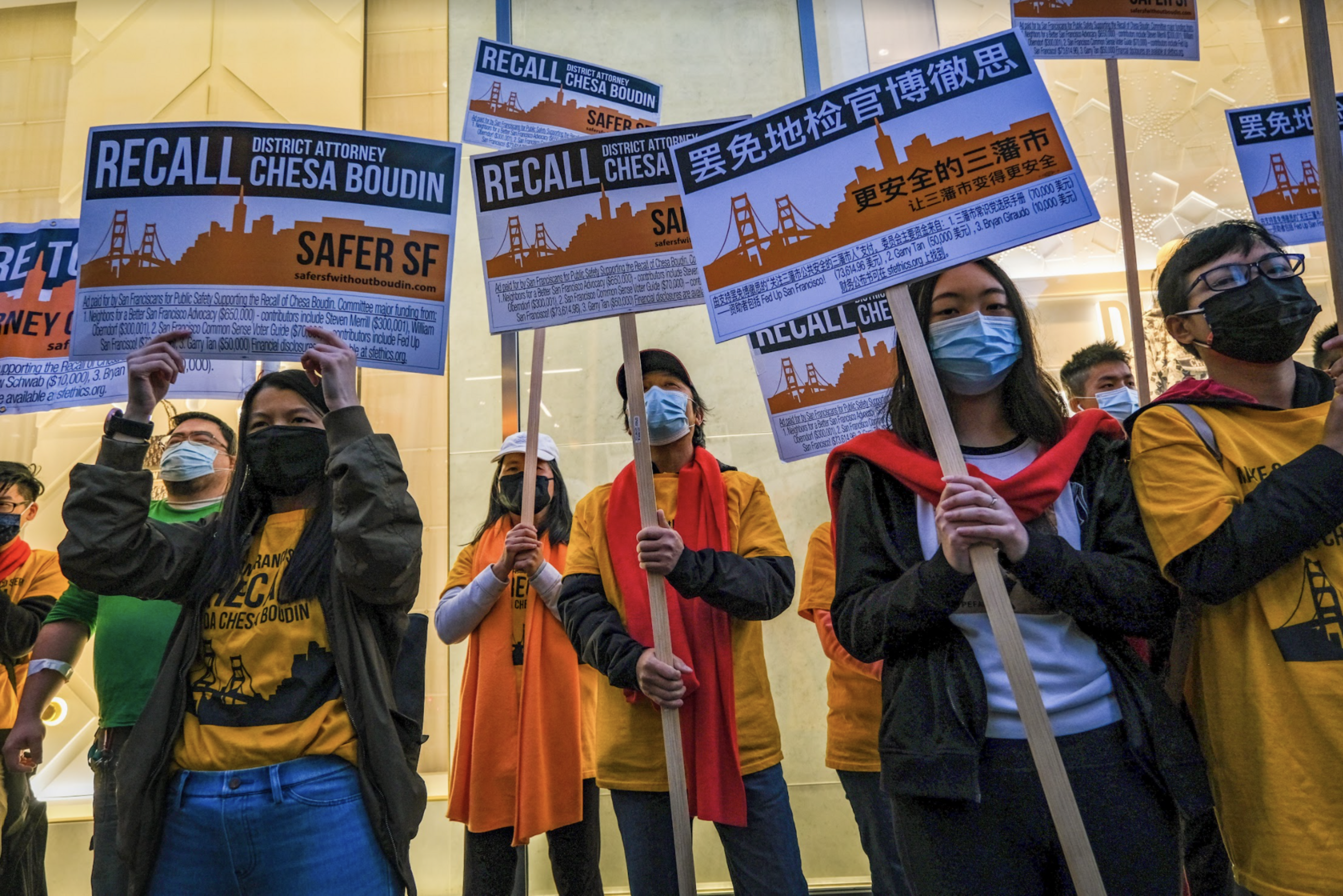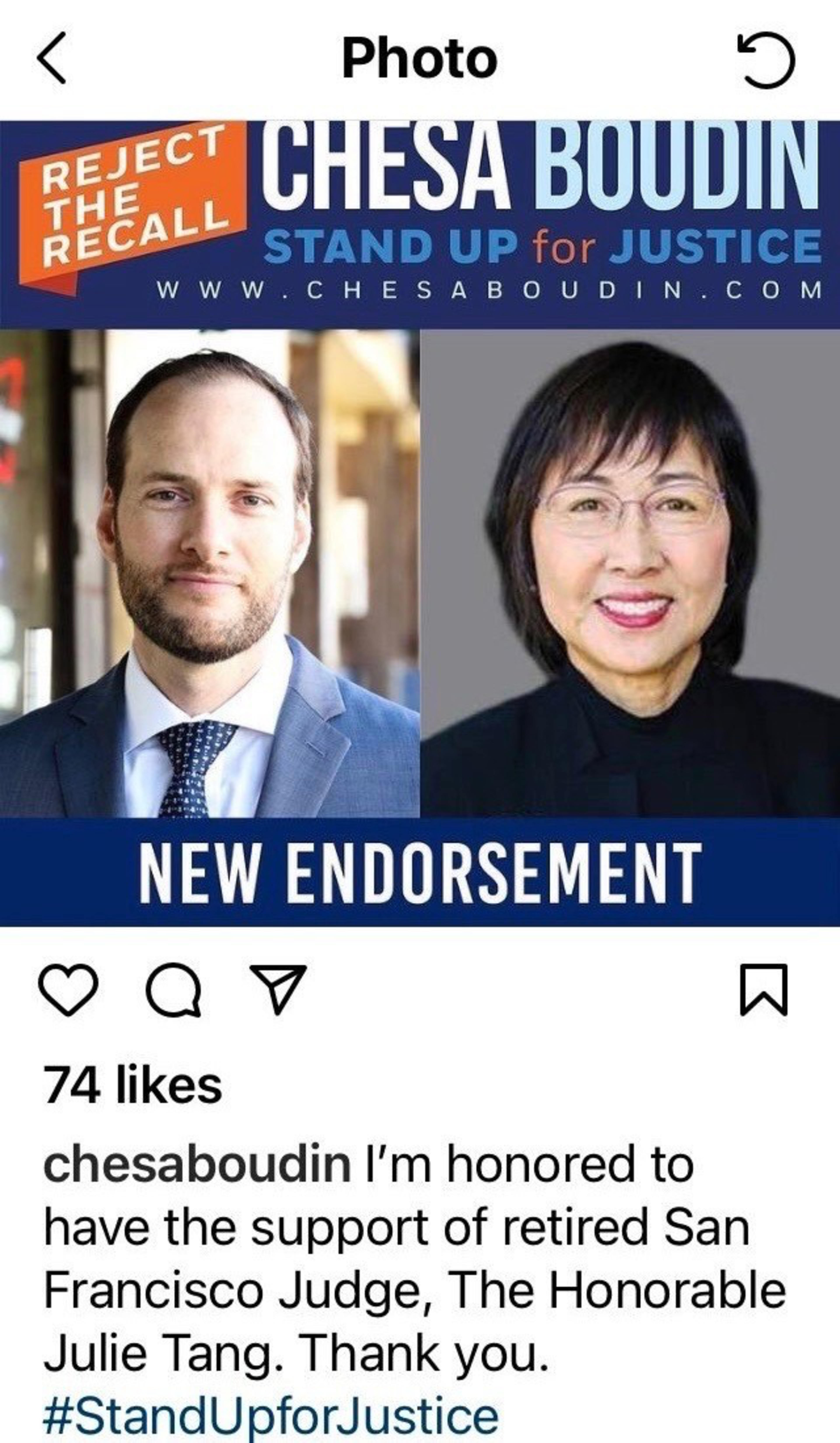A celebration broke out on the Chinese social media app WeChat last month after results for the San Francisco school board recall showed a landslide in favor of removing three members. But a user named “W” wasn’t satisfied.
The next morning, Feb. 16, the Chinese immigrant and 30-year San Francisco resident who refers to himself as “W” or “Mr. Wong,” messaged the 256-member Sunset District neighborhood chatroom and reminded everyone that another recall election to oust District Attorney Chesa Boudin is scheduled for June.
“Don’t expect him to prosecute the criminals who are repetitive offenders and targeting Chinese,” Wong wrote in Chinese.
The emotion that fueled the school board recall seems likely to carry over to the DA’s recall, as anxiety and fears related to public safety in the Asian American community have undoubtedly grown during the pandemic. Mayor London Breed joined Police Chief Bill Scott at a news conference in January to note that anti-Asian hate crimes spiked by more than 560% last year. Many Asian American parents were energized to volunteer for the school board recall campaign because of education issues, but the Stop Asian Hate movement might trigger an even stronger political reaction.
Viral videos showing Asian elders getting pushed to death or stabbed in broad daylight (opens in new tab) have become ubiquitous on social media. The mounting anger and frustration in San Francisco, particularly among the Chinese American and immigrant communities, has mobilized many traditionally apolitical residents to engage in the process. Recalls are potentially being seen as a more expedient way to remove officials who are viewed as inefficient or simply uninterested in residents’ concerns.
Data Debate
Boudin, the progressive DA who is often accused of being “soft” on crime, has become an easy target to blame as polling shows San Franciscans are increasingly feeling less safe—even though most violent crime stats have been declining for years. The backlash has grown to the point that hecklers (opens in new tab) traditionally confined to social media were following Boudin around on foot at the Lunar New Year Parade last month.

Boudin has defended his prosecution rates (opens in new tab) while his opponents are pointing to other data (opens in new tab). The debate on whether Boudin is responsible for San Francisco’s perceived lawlessness will certainly be a focal point between now and election day on June 7.
Boudin’s campaign highlighted the DA’s efforts to make the city’s Asian American community feel safe in a statement to The Standard.
“DA Boudin believes every victim deserves support and every person has the right to feel safe in their community,” said Julie Edwards, a Boudin campaign spokesperson. She noted that Boudin has promoted Asian Americans in his office, charged hate crimes involving Asian Americans, and expanded Cantonese language access by hiring bilingual staff.
But for Mary Jung, an Asian American woman and chair of the Safer SF Without Boudin recall campaign, those efforts have either not gone far enough or simply failed. In a campaign video (opens in new tab), she said that “Chesa’s failure has resulted (in) an increase of crimes against Asian Americans.”
In a statement, Jung slammed Boudin’s administration for “a shocking pattern of mistreating API community members and victims.” She cited high-profile cases like that of 84-year-old Chinese immigrant Rong Xin Liao, who was jump kicked by a suspect whose case is going through behavioral court instead of a criminal trial. She also criticized Boudin’s controversial quote (opens in new tab) in which he said the attacker of 84-year-old Thai immigrant Vicha Ratanapakdee was having a “temper tantrum” when he shoved the man to his death.
“Victims consistently tell us they feel that the DA does not care about them, their families, and our communities,” Jung continued in the statement.
Even though Boudin was not the first choice for many Asian Americans (opens in new tab) in 2019, he hasn’t always faced strong opposition in the community.
Ranking Boudin
David Ho, a Chinese American political consultant, said Boudin’s support from the Chinese community was in many ways “crucial” to his narrow win. Ho formerly worked on an independent campaign supporting Suzy Loftus, who Mayor Breed appointed to the DA position after George Gascón resigned in the fall of 2019. But now, Ho is working to defeat the recall campaign on Boudin’s behalf.
Ho said the district attorney’s 2019 endorsement from Sing Tao Daily (opens in new tab), one of the major Chinese-language media companies in the Bay Area, as well as other Asian American grassroot groups, guaranteed him about “5,000 votes” in that race. Additionally, Boudin picked up more than 13,000 votes (opens in new tab) from Nancy Tung, who many Chinese Americans supported, thanks to San Francisco’s ranked-choice voting system. Tung’s votes transferred over to Boudin and helped him edge out Loftus.
But the dynamics appear to have changed in the last two-plus years. Bing Wang, a Chinese immigrant and school parent who supported Boudin in 2019, is now supporting the recall.
Wang’s home was recently burglarized and other notable crimes in the city prompted her to rethink her position—even though she believes Boudin’s recall is just a small step.
“I am not supporting him now, but I don’t think he is the root cause of crimes in San Francisco,” Wang said.
For some other prominent figures in the city’s Asian American community, publicly supporting Boudin has become a struggle. Earlier this year, Boudin’s Instagram account posted an endorsement showing the smiling face of retired San Francisco Superior Court Judge Julie Tang.

Later, the DA’s account took down the post.
Tang told The Standard that her position on Boudin is unchanged, but she received a lot of “distractions” from people who disagree with her on the recall, so she asked Boudin to leave her name out of his campaign.
“It is still my position to not support the recall,” Tang said, “Chesa Boudin is a compassionate DA who wants to do something about a broken criminal justice system.”
Boudin still has a long list of support (opens in new tab) from Asian American elected leaders in the city, including former and current supervisors. No major San Francisco elected official has endorsed the recall, and a recent vote by the local Democratic Party overwhelmingly opposed the recall, with just Boudin’s 2019 election opponents—Tung and Loftus—voting to endorse his early removal from office.
However, that may not hold in the months to come.
Mayor or May Not
Mayor Breed has been applying an increasing amount of pressure on the DA and notably did not invite Boudin to two news conferences in which she and Police Chief Scott focused on rising crime in the city. The war between Boudin and Chief Scott has become increasingly nasty in the last month over the agreement on how to investigate police shootings and the handling of victims’ DNA.
Norman Yee, a former Board of Supervisors president who is now retired, said some Asian community members’ blame on Boudin has been “unfair.”
He praised the DA’s hiring of Kasie Lee, a bilingual, Chinese-speaking head of victim services, and also noted that Boudin is charging crimes at a higher rate than his predecessor Gascón. “If people don’t see that, they already made the decision before everything started,” Yee said.
Yee also pointed out that the Chinese American community is not monolithic and has diverse voices.
“When you say the Chinese community, it’s not all the Chinese community, it’s a portion of the Chinese community,” he said.
Former San Francisco police commissioner Vincent Pan, now one of the leaders of the Stop AAPI Hate (opens in new tab)reporting project, said the DA is just a part of the criminal justice “system” along with other law enforcement agencies, government entities and community groups, which are all responsible for public safety.
“It’s more important we hold the system accountable (rather) than any one person,” Pan said, adding that he’s concerned public safety issues are highly politicized while “policing and prosecution only addresses violence and crimes after they happened.”
Pan said he prefers a regular election over the recall process, which would hand over control of who is appointed to Mayor Breed.
“The recall doesn’t tell you who’s going to replace,” Pan said. “Elections on a normal schedule are better because you have a choice.”
